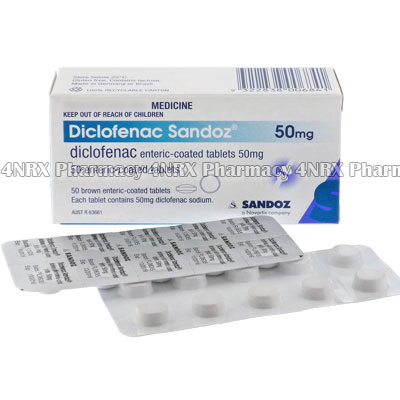 |
Home  Pain Pain  Diclofenac Sandoz (Diclofenac Sodium) Diclofenac Sandoz (Diclofenac Sodium) |
|
|||||||||
|
|
Diclofenac Sandoz (Diclofenac Sodium)
What is Diclofenac Sandoz (Diclofenac Sodium) used for? Diclofenac Sandoz (Diclofenac Sodium) is an oral non-steroidal anti-inflammatory drug (NSAID) prescribed to treat patients suffering from conditions such as osteoarthritis, rheumatoid arthritis, gout, or lower back pain. The medication reduces the action of certain enzymes in the body to stop swelling, pain, irritation, and other similar symptoms associated with these conditions. Your doctor may also prescribe its use for the treatment of other unlisted conditions. How should I use Diclofenac Sandoz (Diclofenac Sodium)? Diclofenac Sandox (Diclofenac Sodium) is normally administered once daily, but your particular instructions will be determined by your doctor based on your age, weight, the condition being treated, and the severity of your symptoms. These should be swallowed whole and unaltered along with a large glass of water and may be taken on an empty stomach, although a snack or meal is suggested before use if you experience nausea. Do not change the form of the tablets as this may destroy or alter the effects of their contents. Ask your doctor or pharmacist any questions you have about the medicine to make sure you are using it correctly. What are the side effects of Diclofenac Sandoz (Diclofenac Sodium)? Diclofenac Sandox (Diclofenac Sodium) may cause side effects in some patients such as:
Serious side effects that may require immediate medical attention are severe headaches, sensitive skin, easier bruising, chest pain, difficulty breathing, severe nausea, fever, flu symptoms, severe skin reactions, darkened urine, discoloured stools, or jaundice. Tell your doctor as soon as you experience any worrying or intense symptoms to make sure the necessary changes are made to your application frequency or dosage to stop further complications from occurring. Please Note Do not begin using Diclofenac Sandoz (Diclofenac Sodium) if you are in the third trimester of pregnancy, allergic to NSAID medications, if you have had a bad reaction to similar treatments in the past, or if you have heart failure, an active peptic ulcer, peripheral arterial disease, ischaemic heart disease, severe liver failure, or severe kidney failure. You are also suggested to inform your doctor if you have diabetes, a history of asthma, a history of allergies, hypertension, high cholesterol, inflammatory bowel disease, clotting disorders, systemic lupus, or reduced liver or kidney function. These conditions may cause unexpected complications requiring alterations to your regimen. Strictly use Diclofenac Sandoz (Diclofenac Sodium) as prescribed and follow all instructions provided by your doctor. Safe, suitable, and optimum dosage can vary and is dependent on the patient`s health and medical history, as well as the condition you are treating. Diclofenac Sandoz (Diclofenac Sodium) may not be safe or suitable for all patients. Always ensure your doctor is informed if you are pregnant or breastfeeding, using any other type of medication (including non-prescription medicine, vitamins, and supplements), as well as if you have any allergies, other illnesses, or pre-existing medication conditions. Seek immediate medical attention or proceed to your nearest accident and emergency department if you suffer a hypersensitive or allergic reaction. Symptoms usually present during a reaction of this nature include difficulty breathing or swallowing, swelling of the limbs or face, tight chest, hives, and skin rashes. 
|
||||||||||||||||||